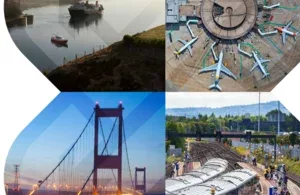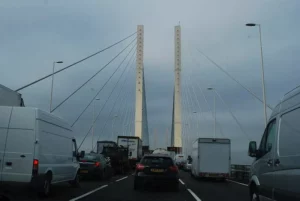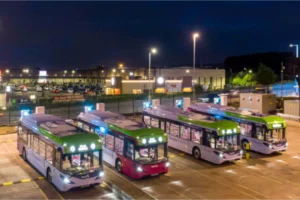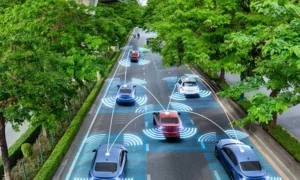Following yesterday’s annoucement that transport connections across the UK are set to be improved through better infrastructure and developing a UK strategic transport network, Prime Minister, Boris Johnson, wrote in the Telegraph about the Union Connectivity Review. Here’s what he had to say:
I know there are plenty of people who think we should be going faster out of lockdown. They look at the success of the UK vaccine rollout. They see the falling numbers of deaths and hospitalisations. They think the Government should hurry up and bring forward the timetable. To all of those who want to speed up I say, I understand your urgency. I share your desire to get back to normal.
But we must recognise that the rate of infection is still high – much higher than last summer. We can see the signs of a surge of Covid among some of our European friends, and we remember how we in the UK have tended to follow that upwards curve, if a few weeks later.
We know how fast this disease can take off, and that Monday’s successful return to school will inevitably add to the budget of risk. The overwhelming majority of people – and businesses – would prefer us to take steps that are cautious but irreversible, rather than go backwards again. They would rather trade haste for certainty.
So we will continue on the roadmap we have set out, step by step, jab by jab, until we can get absolutely everything open, at the earliest by June 21. Businesses know how much time they have to plan, and to get ready, and we in government cannot afford to waste a second of the coming weeks. Now is the time to lay the foundations of a lasting and growing recovery. We will prepare to clear the backlogs – from the NHS to the courts. We are bringing forward an ambitious education recovery programme, with a new focus on tutoring.
We are addressing the underlying productivity problems of the economy, some of which have been neglected for decades. We are continuing to deliver broadband, at breakneck speed; we are offering a new Lifetime Skills Guarantee; and we are investing massively in the clean and efficient transport projects that can make such a difference to people’s lives and which are so crucial for creating the high-wage jobs we need.
As we look at the transport network, there is a particular weakness that has become steadily more obvious in the last 20 years. We have become far too segmented in our thinking.
For far too long, we have tended to carve up the country through a devolve and forget approach. We have devised transport strategies for Scotland, for Wales, for Northern Ireland and Northern England – and yet, incredible as it may seem, we have failed to produce a UK-wide transport strategy.
We left it, bizarrely, to the EU, which had a concept called the “Trans-European Transport Network”. The UK paid handsomely for our friends to draw these lines on the map, about 420 million euros per year. We only got about ten per cent back. The result is that the sinews of pan-UK transport have atrophied, with inadequate connections, needless bottlenecks and endless delays on the vital links between one part of the UK and another.
So together with Transport Secretary Grant Shapps, I have asked Sir Peter Hendy to address the problem of Union connectivity. He has just produced his interim report, before final conclusions in the summer.
He lays out the scale of the challenge. Take the A1 – still a single carriageway most of the way north of Newcastle and on into Scotland, in spite of decades of promises.
Look at the delays on the M4 as it goes west into South Wales. [Political content removed]. The North Wales economy has amazing potential in aerospace and other sectors. But too little thought has been given to the links to Merseyside and Manchester, to the North Wales railway or the A55. It’s currently quicker to get a train from Cardiff to Paris than from Cardiff to Edinburgh, and why are we stopping HS2 in England? We don’t need a new line; with some bypasses, better track and signalling, as Sir Peter believes, we could run services from Glasgow to London in about 3 hours, and carry more freight too.
It seems wrong that someone flying from Belfast to London and back pays more UK tax than someone flying from Dublin to London and back. Isn’t it time to harvest that Brexit dividend and cut Air Passenger Duty to support connectivity across our Union? We will consult on choices to do that.
And there was one project that Sir Peter found to command overwhelming support – the A75 from Cairnryan in Scotland to the English border. It is a crucial route for south-west Scotland, for traffic between Great Britain and Northern Ireland, and indeed the whole island of Ireland. This road connects three parts of the UK – Northern Ireland, Scotland and England. But it is a single carriageway. For 95 miles. This a long-term arteriosclerosis caused by our failure to think as one UK. As Sir Peter concludes his report, I hope he can produce the beginnings of a truly pan-UK transport strategy.
We in the UK Government look forward to working with our partners and friends in the devolved administrations, to see if we can deliver this plan together – not to supplant their own agendas, but to supplement them for the benefit of all the people of the UK.
We want to improve pan-UK transport links so as to reduce traffic and to reduce pollution, in a way that is as clean and green and efficient as possible. It is time to begin to strengthen the very sinews – the musculoskeletal structure – of the United Kingdom, so that we can recover faster and stronger together.





















